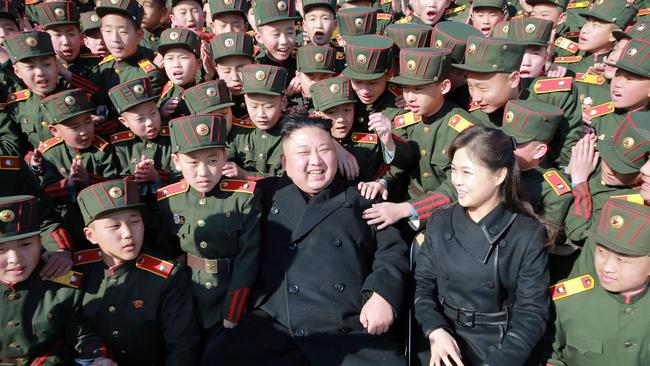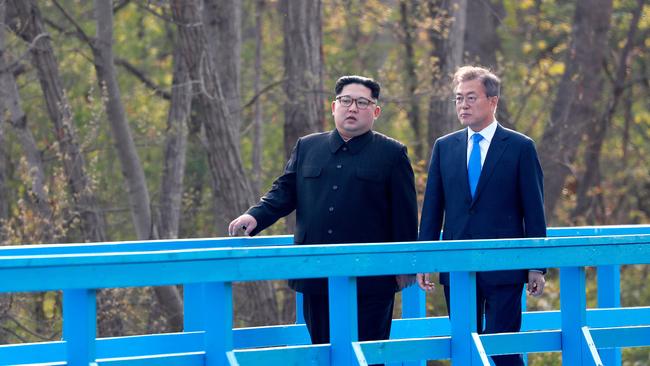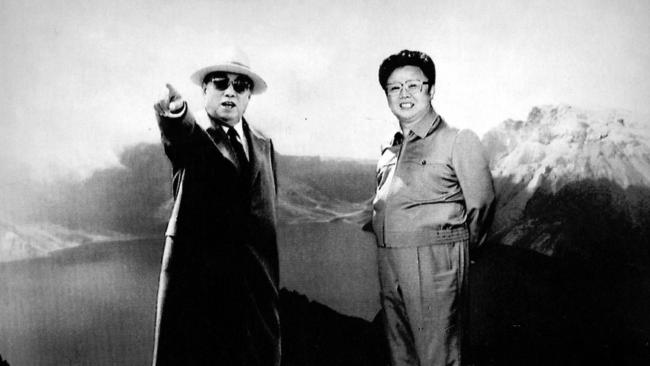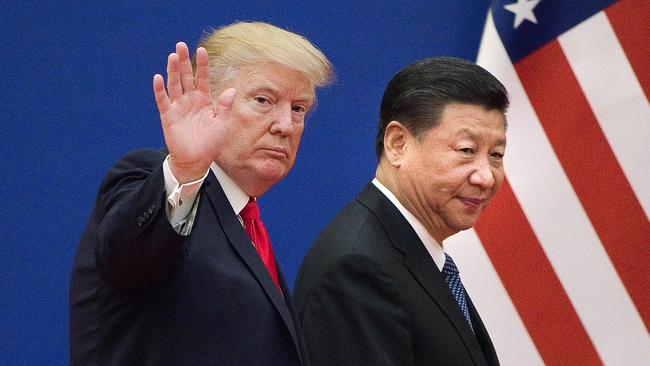Ruthless Kim Jong-un calls the shots at home and, now, abroad
Kim Jong-un is the brutal leader of an indefensible regime, but his malign brilliance has resulted in amazing achievements.

When the coffin of Kim Jong-il, the dictator of North Korea, processed through the snowy streets of Pyongyang, eight men trudged alongside it. Four wore the uniforms of generals, four the suits of civilian apparatchiks.
It was December 2011, and to those in the know watching around the world it seemed quite clear who was who, and where power and authority lay.
There was Chang Sung-thaek, the 65-year-old brother-in-law of Kim, a man who had spent a lifetime negotiating the intricacies of Pyongyang politics. There was vice-marshal Ri Yong-ho, the 69-year-old contemporary of the dead leader and head of the million-strong Korean People’s Army. And at the front right of the coffin was a chubby young man, whom no one outside Pyongyang knew much about at all.
He was said to be 27 or 28, to have spent his teenage years in Switzerland, and to have acquired a love of basketball and German electropop. He had no known experience in the armed forces or government. Apart from being his father’s designated heir, there was nothing obvious about him to command the loyalty of the granite-faced men who walked at his side.
Some Pyongyang-watchers imagined him being pushed aside by one of them within a year or two — at best, he might serve as a figurehead and puppet, obediently signing off on the decisions made by the grown-ups. Six and half years have passed since then, and it is chastening to acknowledge how grossly the world underestimated Kim Jong-un.
Just to have survived would have been achievement enough but he has gone a great deal further than that. The seven other men around the hearse are retired, dead or vanished, most of them the victims of ruthless, rolling purges that have left Kim in an unchallenged position of power.

The brutality of the state apparatus is as intense as ever but in superficial ways there have been striking changes in style — a veneer of openness and even an eccentric glamour — that would have been unimaginable in the past.
Under his father, millions of people died from famine as a result of the country’s chronic food shortages; under Kim Jong-un, markets and entrepreneurship have been permitted to flourish on a modest scale, enough to alleviate the worst effects of economic collapse, although never so much as to threaten the controlling hand of the state. But these are trivial achievements compared with the central accomplishment of Kim: his success in establishing North Korea as a nuclear power.
At the time of Kim Jong-il’s death, it had carried out two nuclear tests and was reckoned to have a handful of warheads, although not the means to propel them any great distance.
Today, the Korean People’s Army has 20 or more nuclear bombs (part of its achievement is that no one seems sure how many). The last one it set off, in its sixth and biggest underground test, may have been a hydrogen device. On top of this, a relentless program of rocket development has created intercontinental ballistic missiles with the potential to launch nuclear weapons at the US.

These developments have excited international rage and alarm, and the most intense sanctions ever levied against North Korea. Kim has ridden them out.
Then, at the start of this year, he executed another move that no one predicted: a diplomatic pivot from confrontation to engagement, culminating in last Friday’s summit with South Korean President Moon Jae-in.
Most remarkably, in a few weeks he is scheduled to meet Donald Trump. It is worth lingering a little over what this means. In the 21st century, the leader of a small, almost bankrupt, pariah nation, the last relic of the Cold War, succeeds in acquiring nuclear weapons — not the medium-range variety possessed by India, Pakistan and Israel but the kind that can traverse the Pacific Ocean.
Far from isolating him, they have brought to the negotiating table the US President (who has executed a pivot of his own, from describing Kim last year as “clearly a madman” to last week calling him “very honourable”).
Kim is the brutal leader of an indefensible regime, but you don’t have to like him to acknowledge these as amazing achievements. As Trump put it last year: “He was a young man of 26 or 27 when he took over from his father … He’s dealing with obviously very tough people, in particular the generals and others. And at a very young age he was able to assume power. A lot of people, I’m sure, tried to take that power away … And he was able to do it. So obviously he’s a pretty smart cookie.”

Who is Kim Jong-un and what are the origins of his malign brilliance? It is a symptom of how ignorant the rest of the world is about North Korea that our best sources on his life and character are not diplomats or scholars but American celebrity basketball player Dennis Rodman and a Japanese sushi chef known as Kenji Fujimoto. Accounts differ but according to Rodman, who celebrated Kim’s birthday with him in Pyongyang in 2014, he was born on January 8, 1983.
His oldest brother, Kim Jong-nam, was the son of Kim Jong-il’s first wife, a famous North Korean film star who was cast off by her husband and died in exile. Jong-un and Jong-chul, two years older than him, were born to a dancer named Koh Young-hee. Before her death in 2004, state media had begun referring to her as “respected mother”, suggesting that one of her boys was being groomed for the leadership.
Like his brothers, Jong-un was educated in Switzerland, where he was passed off as the son of a diplomat at the North Korean embassy in Berne. The older boys went to expensive international schools; “Pak Un”, as he was known, attended a local state secondary. A teacher described him as “well-integrated, diligent and ambitious” but his marks were average to poor. His schoolmates remember his expensive trainers and his love of basketball and of the German pop song Brother Louie by Modern Talking. From time to time he would invite a chum to his embassy lodgings to play video games and watch Jackie Chan and James Bond films.
“One day, he did actually say to me, ‘My father is the leader of North Korea,’ ” recalled a Portuguese friend, Joao Micaelo. “I just thought he was making it up.”
In 2000 he dropped out of his Swiss school to enrol at Kim Il-sung University, Pyongyang’s most prestigious seat of learning. According to Fujimoto, Kim Jong-il’s personal sushi chef, it was obvious from his childhood that Jong-un would take over from his father.
“The older brother, Jong-chul, had the warm heart of a girl,” he said. “The younger prince, Jong-un, was a boy of inner strength.”
As a boy, Jong-un drove a Mercedes-Benz with specially adapted pedals around the grounds of Kim Jong-il’s home. He liked Chinese food and sushi, especially squid and the finest cuts of tuna. He used to cadge Fujimoto’s menthol cigarettes.
As a teenager, he played basketball and, even after casual games among friends, would coach his team-mates and analyse their successes and failures.
“The first time I met him he was seven years old and he looked at me as if I was an evil Japanese who had done terrible things to Koreans in the war,” Fujimoto said.
“I was impressed that even as a young boy he tried to analyse people he met. If power is to be handed over then Jong-un is the best for it. He has superb physical gifts, is a big drinker and never admits defeat.”
His father, Kim Jong-il, was an able tactician and a vigorous drinker and womaniser, but not a natural communicator or visionary. After the leader’s death in 2011, Jong-un’s wisdom was to model himself on his grandfather, North Korea’s founding leader, Kim Il-sung. Old Kim was a guerilla leader who fought the Japanese, brilliantly played China and the Soviet Union off against one another, and ruthlessly purged those who threatened to challenge him. He died when Jong-un was 11 but official portraits soon began to emphasise their physical resemblance.
North Koreans had become used to knowing nothing about the private lives of their leaders and to seeing them only at their frequent and predictable visits to military units and new factories; for the first 58 years of his life, Kim Jong-il was known to have uttered only a single sentence in public.
His son continued the tradition of “on-the-spot guidance” but with an energy and ebullience wholly unlike that of his often sour-looking father.
He also displayed a kind of broad-mindedness, perhaps imparted by his European education. Seven months after his succession, he attended a concert in Pyongyang at which young women dressed as Mickey Mouse and Donald Duck cavorted for his entertainment. It is impossible to picture either of the previous Kims taking pleasure in the culture of the loathed imperialist US.
He was accompanied by an attractive and, by Pyongyang standards, fashionably dressed woman who began to feature in state media coverage of his public appearances. The existence of his predecessors’ consorts was never publicly discussed during their lifetimes. So it was genuinely dramatic when Kim’s mystery date was named as Ri Sol-ju and identified as his wife.
Last month, state media began referring to her by another term more closely associated with the imperialist West than the socialist world: no longer “Comrade Ri” but “respected First Lady”.
To mistake all of this for liberalisation would be a mistake. The grip of the security apparatus remains as firm as ever, and along the long and porous border with China there have been clampdowns on defectors and illicit traders. However broad his smile, Kim has a ruthlessness that more than matches that of his father and grandfather. Executions appear to take place for the flimsiest of reasons. In 2015 the defence minister was purged, and possibly executed, for crimes including falling asleep in the Supreme Leader’s presence.
The summer before, the unnamed head of a state terrapin farm was put before a firing squad after electricity failures led to the deaths of baby reptiles.
But it is the way that Kim has turned on members of his family that has set him apart from his forebears.
In 2013 his uncle, Chang, was executed after he “confessed” to crimes including plotting a coup, the dissemination of pornography, failing to applaud enthusiastically and causing a monument honouring Kim to be erected “in a shaded corner”. Unprecedentedly, in a country that used to present itself as a socialist paradise, the “thrice-cursed acts of treachery” by “despicable human scum Chang” were reported in detail in the state media.
Then in February last year, Kim’s older half-brother, Jong-nam, who had lived for years in Macau, where he had been mildly critical of the regime, was killed with VX nerve agent at Kuala Lumpur airport. According to Malaysian police, the two women charged were acting at the behest of a gang of since-vanished North Koreans. It is difficult to imagine that this was anything other than an assassination authorised by the Supreme Leader himself.
The biggest obstacle to understanding Kim is the lazy notion that he is mad. That he is merciless, oppressive and driven solely by the desire to prolong the life of his anachronistic regime, there is no doubt. But given this strategic goal, his methods readily can be explained in rational terms, from encouraging his own personality cult to instilling fear by wiping out those who may undermine him and, above all, acquiring nuclear weapons.
Kim, it can be assumed, wants to live a long life. For this reason he will never launch an unprovoked nuclear attack, which would invite immediate and overwhelming American and South Korean retaliation and destroy his regime.
But for the same reason he will never give up his nuclear weapons for anything less than unbreakable guarantees of his future security.
The importance of nuclear weapons, not as an offensive asset but as an insurance policy against attack by the vastly superior forces of the US and South Korea, has been a consistent message in North Korean official utterances.
And if consistency of utterance is a measure of sanity, then the madman in 2018 is not in Pyongyang but in the White House.
In intelligence terms, North Korea is a black hole; there is so little reliable information about its leadership that no wise person would make confident predictions. A sudden and violent change, driven by invisible rivalries within Pyongyang, cannot be ruled out. Predictions of this in the past have been wishful thinking.
Since the end of the Cold War, the world has misunderstood the tenacity of North Korea and its leaders, none more than Kim. Among the titbits of information gleaned by South Korean intelligence is that Kim and Ri have three children; Rodman spoke of a little daughter named Ju-ae.
Somewhere in a leadership compound in Pyongyang, perhaps already playing in Dad’s old toy Mercedes, Kim IV may already be biding her time.
The Times
-
Timeline
April 1912:North Korean founder Kim Il-sung is born.
February 1942:Kim Jong-il is born in a guerilla fighters’ camp on Mount Paektu, the highest peak on the Korean peninsula, according to official history.
September 1948: Kim Il-sung establishes the Democratic People’s Republic of Korea.
June 1950: North Korea invades South Korea.
July 1953: The Korean War ends in a truce, not a peace treaty.
October 1980:Kim Jong-il’s status as the country’s future leader is made public at the Workers’ Party congress.
January 1983:Kim Jong-il’s third and youngest son Kim Jong-un is believed to have been born.
July 1994: Kim Jong-il takes power after Kim Il-sung dies of a heart attack.
August 2008:Kim Jong-il reportedly suffers a stroke.
October 2010:Kim Jong-un makes his public debut at what is believed to be the state’s largest military parade.
December 2011:Kim Jong-il’s death at the age of 69 is announced and Kim Jong-un takes over key posts within four months.
February 2013:UN approves new sanctions after North Korea’s third nuclear test.
January 2017:Kim Jong-un says North Korea is in the final stages of developing long-range guided missiles capable of carrying nuclear warheads.
August 2017:China announces it plans to implement UN sanctions against North Korea, banning imports of coal, minerals and seafood.
January 2018:First talks in two years between North and South Korea begin thaw that leads to the North sending a team to the Winter Olympics in the South.
March 2018:The US and North Korea announce that their leaders plan to meet to discuss nuclear disarmament on the Korean peninsula.


